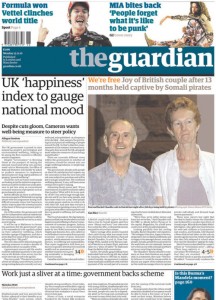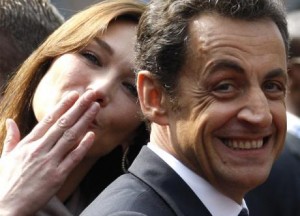Ideas If you can’t stand the “Heat” magazine, get out of Lord Kitchener’s culture
New in Ceasefire - Posted on Wednesday, November 24, 2010 0:00 - 3 Comments

By Paul Taylor
“You don’t have to burn books to destroy a culture. Just get people to stop reading them.”
Ray Bradbury, Fahrenheit 451
According to the German philosopher Martin Heidegger “Questioning is the piety of thought”. If he is right, then, at a time when notions as pathologically vacuous as “the big society” and a “happiness index” dominate the airwaves, we appear to be living so impiously that even the Borgias might blush. Two key factors underpin this situation:
1. The puzzlingly unchallenged narrowness of the social background from which our cultural and political leaders hail.
2. The corresponding narrowness of the intellectual frame of reference within which political and cultural debates take place.
The very obviousness of point one is perhaps what gives it a sense of inevitability, a sense further exacerbated by the apparently unassailable position occupied by today’s gatekeepers of the public sphere – the media’s commentariat who tend to come from the same privileged background as those they purportedly hold to account.
This raises the crucial question, quis custodiet ipsos custodes (who will watch the watchmen)? I argue here that to address properly entrenched social privilege we need to pay more attention to the (un)critical supporting role played by cultural factors.
Born within a year of each other, Nick Clegg and David Cameron, the two party leaders of the current UK government coalition, are also close in their shared position within a privileged educational and social class that routinely monopolizes British political life. Perhaps less obvious, however, is the more casual (but all the more effective for its casualness) domination with which this same narrow social class is also able to frame “non-political” culture.
Ray Bradbury’s dystopian novel Fahrenheit 451 portrays cultural censorship as institutionalized book-burning carried out by “firemen”. Its relevance to our times is indicated when a character describes how “the word ‘intellectual,’ of course, became the swear word it deserved to be” but the book’s dystopian depiction fails to capture the much less threatening, much more natural feel of today’s anti-conceptual climate.
Book-burning, though extreme, at least implies the survival of a vestigial, fearful respect for the power of the written word. Fahrenheit 451’s truly dystopian, but topically relevant, theme is the degree to which such book-burning becomes unnecessary. As one of the characters notes: “Remember the firemen are rarely necessary. The public stopped reading of its own accord. You firemen provide a circus now and then at which buildings are set off and crowds gather for the pretty blaze, but it’s a small sideshow indeed, and hardly necessary to keep things in line. So few want to be rebels any more.”
Marshall Mcluhan describes the British ruling class’s long-established antipathy towards erudition that has any political implications: “Said the Duke of Gloucester to Edward Gibbon upon the publication of his Decline and Fall: ‘Another damned fat book, eh, Mr. Gibbon? Scribble, scribble, scribble, eh, Mr. Gibbon?’”. An under-acknowledged social taboo today consists of the almost complete absence in public discourse of any reference to a whole tradition of European cultural and philosophical theory.
Put simply, a large swathe of Western society’s greatest thinkers – Kant, Hegel, Heidegger, Sartre, Derrida, and Deleuze (to name but a few of the most egregiously ignored) fails to register on the media’s radar. If flickering blips of recognition do occur, they tend to be safely contained, as in Heidegger’s case through the fetishization of his undoubtedly reprehensible Nazi past by our media culture’s obsessive need to displace conceptual substance with biographical detail.
As the epitome of what is currently deemed to be cerebral media, BBC Radio Four further ensures the exclusion of critical thought through its overwhelming and exclusionary preference for historical and literary themes (ideally combined in its most favoured wall-to-wall format of all – historical costume dramas) over any form of critical thought. In both media structures and social attitudes, this systematic exclusion is both a cause and effect of class-based privilege.
A major stumbling block to analysing the notion of class is the paradoxical nature of British attitudes to the term itself. Hence, in today’s purportedly class-free meritocracy, the concept is deemed to be anachronistic even whilst it is smuggled in again via the back door in order to disparage critics of the status quo as sufferers of “class envy”.
To paraphrase Herbert Marcuse (the sort of thinker that is systematically overlooked by the powers-that-be), “the envious sound of these propositions is indicative, not of their utopian character, but of the strength of the forces which prevent their realization.” An illustration of the intertwined nature of political and social privilege that underlies British society’s embargo of critical thought can be seen within the normal functioning of our much-vaunted democratic system. For example:
1. At the last General Election, two independent-school-educated members of the “New” Labour Party, Tristram Hunt (the son of Lord Hunt of Chesterton) and Luciana Berger were parachuted by the national party into traditionally working class urban constituencies – Hunt into Stoke-on-Trent and Berger into Wavertree, Liverpool. Since I was born and bred in the latter city, I can confirm that Luciana is not a name encountered frequently at the local shops, I suspect that those more familiar with Stoke-on-Trent than myself would also confirm the likely difficulty of finding many Tristrams on the ground there either.
2. Shortly prior to the same election, a member of the audience on BBC TV’s political debate programme Question Time asked the panel of assorted politicians and public figures a pointed question about the desirability of the disproportionately public-school/Oxbridge University-educated nature of British political leaders. The chairman David Dimbleby (educated at Charterhouse school and a member of Oxford University’s [in]famous Bullingdon Club), proceeded to light-heartedly ask the panel who happened to be the most privileged amongst their own number. The class-orientated direct question was defused with a degree of sang froid that possibly only the incontrovertibly self-entitled can muster so effortlessly.
Addressing the charge of class envy directly, I do not draw attention to these examples simply to denigrate the presence in British public life of a large number of Oxbridge graduates. Given its unarguable world class status, one can fully expect a disproportionate Oxbridge representation. However, there is a crucial distinction to be made between a dis-proportionality that can be traced to ability and its more incestuous cousin – disproportionately class-based disproportionality.
 The first of the above examples indicates a disturbing inability or unwillingness of formerly radical working class Northern constituencies to offer a critical challenge to a Metropolitan-derived droit de seigneur.
The first of the above examples indicates a disturbing inability or unwillingness of formerly radical working class Northern constituencies to offer a critical challenge to a Metropolitan-derived droit de seigneur.
The second example demonstrates how, even on the few occasions when direct criticism of the situation is voiced, the equanimity of the self-entitled remains unruffled.
The “envy” in the phrase “class envy” misleadingly implies resentment of those who have desirable qualities. The point here is that, in practice, any recognition of true quality is trumped by mere privilege. Similarly, the objection is not to a form of cultural elitism based upon ability but the fake nature of an elitism which, in its normal mode of functioning, actually prevents genuinely elite thoughts and people from breaking through the Tiffany glass ceiling.
The barriers to critical thought are such that even the workers’ own history is vulnerable to the proprietory/predatory self-indulgence of its unselfconscious overlords. Thus, in 2004 Tristram Hunt was able to publish in the Guardian newspaper an article critical of the allegedly elitist tendencies of Robert Noonan, author of the classic socialist novel The Ragged Trousered Philanthropist. In a similar vein and tenor, Hunt also later wrote ‘The Frock-Coated Communist: The Revolutionary Life of Friedrich Engels’.
The full title of Hunt’s critique of Noonan is “A ragged trousered elite who preached secular salvation: The working-class classic with an ambivalence about real workers”. To repeat for clarity’s sake: in this article, an Oxbridge graduate friend of Lord Mandelson named Tristram, who was later parachuted into a working-class constituency, feels entitled to criticise how:
Like many a Marxist scholar, Noonan blamed working-class lethargy on the effects of popular culture. The depoliticised world of the pub, organised sport and the yellow press was surreptitiously deadening class loyalties. And so the only real way to achieve political progress was for a properly educated, implicitly middle-class elite – led by the likes of Owen and his wealthy, articulate co-revolutionary Barrington – to drag the blighted working class towards the socialist future.
This was the uncomfortable political reality behind Noonan’s “working-class classic … But the rank-and-file should be on their guard. For does Noonan simply foster working-class consciousness – or justify the leadership of a socialist elite?
Rather than worry about the dangers of a socialist elite, the “rank-and-file” might most usefully remain on their guard against listening to political advocacy from distinctly non-socialist and heraldically unreflexive elites who seek to defend the politically deadening effects of mass culture. Being on guard should make the rank-and-file suspicious about the elite’s disparagement of a working class aspiration for political change achieved through hard-earned access to the sort of education others assume as a birth-right.
Critical theory (of various shades and hues) is frequently and bone-headedly misrepresented by those it threatens as a form of postmodern relativism, scorned as overly abstract and unworldly, or, as we have previously seen, simply ignored by our cultural gatekeepers. Stubbornly, however, its inherent reflexivity provides a highly useful perspective from which to question the validity of socially-sanctioned intellectual parochialism designed to bolster pre-existing privilege.
In this context, appropriately enough, on the day I finished writing this article, Tristram Hunt was the BBC Radio 4’s chosen parliamentary respondent to the announcement that Prince William was engaged to be married. Seamlessly merging his thoughts with the Government’s desire to create a happiness index, the Right Honourable Hunt suggested that even those not normally well-predisposed towards the Royal Family would be delighted by the news and as a result might find themselves buying the celebrity-fixated Heat magazine to check up on the latest royal gossip.
 How ironic it is that a magazine called Heat is used to describe the cultural fire-proofing of Fahrenheit 451’s burning admonition. In our deeply impious times, today’s happy firemen appear to be enacting Bradbury’s erstwhile satire:
How ironic it is that a magazine called Heat is used to describe the cultural fire-proofing of Fahrenheit 451’s burning admonition. In our deeply impious times, today’s happy firemen appear to be enacting Bradbury’s erstwhile satire:
Give the people contests they win by remembering the words to more popular songs or the names of state capitals or how much corn Iowa grew last year. Cram them full of non-combustible data, chock them so damned full of ‘facts’ they feel stuffed, but absolutely ‘brilliant’ with information.
Then they’ll feel they’re thinking, they’ll get a sense of motion without moving. And they’ll be happy, because facts of that sort don’t change. Don’t give them any slippery stuff like philosophy or sociology to tie things up with. That way lies melancholy …
We’re the Happiness Boys … We stand against the small tide of those who want to make everyone unhappy with conflicting theory and thought. We have our fingers in the dike. Hold steady. Don’t let the torrent of melancholy and dreary philosophy drown our world.
So next time you listen to a discussion about national happiness, please hold a melancholic thought for the dreary philosophy they don’t want you to read … but which the cultural elite no longer need to burn.
 Paul Taylor is Senior Lecturer in Communications Theory at the Unversity of Leeds.
Paul Taylor is Senior Lecturer in Communications Theory at the Unversity of Leeds.
In addition to “Zizek and the Media”, he is the author of several books including “Critical Theories of Mass Media: Then and Now”.
3 Comments
Andy
Interesting points. And it isn’t just philosophy that never gets a look in. Science is even more neglected since it ceased to be the domain of the gentleman of independent means.
Teofila Popham
Timely article . Apropos , if you is looking for a service to merge two images , my friend found a service here http://goo.gl/8njea9.


They ignore pretty much all the humanities and social sciences actually, unless it fits their pre-existing frame. For example, they let in the security studies types in terrorism discussions, but rarely if ever the cultural studies/postcolonial analysts. They do history and literature, but in a very outdated way. There are things which are very extensively “proven” in sociology – that deterrent punishment doesn’t work for example, and that western demographics will collapse without immigration – that are still routinely derided as unthinkable in the media. I suspect the powers-that-be know these things, but would rather the rest of us didn’t. Though there’s also the effect of the way media priorities filter out anything complex, long-term or insufficiently sensational.